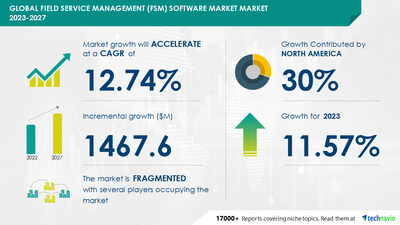Field Service Management (FSM) Software Market size is set to grow by USD 1.890.3 million from 2024-2028, Various pricing strategies by vendors to boost the market growth, Technavio

NEW YORK, July 10, 2024 /PRNewswire/ — The global field service management (FSM) software market size is estimated to grow by USD 1.89 billion from 2024-2028, according to Technavio. The market is estimated to grow at a CAGR of over 14.27% during the forecast period. The rapid growth of the FSM market is primarily driven by increasing adoption of advanced technologies like predictive analytics, aimed at enhancing operational efficiency and customer satisfaction. Vendors are leveraging various pricing strategies to attract customers, contributing to market expansion. Despite challenges such as high deployment costs, the market benefits from robust demand across industries seeking to optimize field operations. Key players such as Salesforce, SAP, and Oracle are pivotal in shaping industry dynamics with innovative solutions.
Get a detailed analysis on regions, market segments, customer landscape, and companies – Click for the snapshot of this report
|
Forecast period |
2024-2028 |
|
Base Year |
2023 |
|
Historic Data |
2018 – 2022 |
|
Segment Covered |
End-user (IT and telecom, Healthcare, Retail, Transportation and logistics, and Others), Deployment (On-premise and Cloud-based), and Geography (North America, Europe, APAC, Middle East and Africa, and South America) |
|
Region Covered |
North America, Europe, APAC, Middle East and Africa, and South America |
|
Key companies profiled |
Advanced Computer Software Group Ltd., Comarch SA, FieldAware Group Ltd., FieldEZ, Fortive Corp., GeoConcept SAS, IFS World Operations AB, Infor Inc., Microsoft Corp., MSI Data LLC, Oracle Corp., OverIT Spa, PTC Inc., Salesforce Inc., SAP SE, ServicePower Inc., Simpro Group, Syncron Holding AB, Trimble Inc., and Zinier Inc. |
Key Market Trends Fueling Growth
After-sales service is essential for businesses to maintain profitable maintenance contracts and foster long-term customer relationships. Traditional maintenance schedules may not be optimal due to unpredictable factors affecting equipment performance. Predictive analytics integrated into Field Service Management (FSM) software is revolutionizing the industry. By analyzing equipment data, these solutions identify potential failures before they occur, enabling proactive maintenance and reducing downtime. This enhances product quality, increases customer satisfaction, and lowers costs. Predictive analytics is a key trend in the global FSM software market, expected to drive growth during the forecast period.
In today’s business landscape, Field Service Management (FSM) software has become a must-have tool for managing mobile workforces. Trends in FSM include real-time access to critical data, integration with back-end systems, and collaboration tools for field technicians. Customer data and service history are essential for providing excellent service and resolving complex issues efficiently. Mobile devices and cloud-based, subscription-based offerings enable real-time communication and updates for job assignments, information sharing, and problem resolution. Advanced FSM solutions offer augmented reality for real-time guidance and expertise, improving productivity and reducing costly return visits. Integration complexity, talent shortage, and economic uncertainty are challenges for businesses. Digital transformation and mobile-based FSM solutions offer cost-effective alternatives, but security concerns, such as data confidentiality and data breaches, must be addressed. Communication, collaboration, and compliance are crucial for operational efficiency, and mobile technology, such as tablets, are essential tools for field technicians. In conclusion, FSM software trends focus on real-time access, collaboration, and integration to improve operational efficiency, productivity, and customer satisfaction. However, businesses must consider the challenges of integration complexity, talent shortage, and economic uncertainty while addressing security concerns and ensuring compliance.
Discover 360° analysis of this market. For complete information, schedule your consultation- Book Here!
Market Challenges
- The global field service management (FSM) software market faces challenges due to the high cost of implementation. This expense includes software licensing, implementation and training costs, maintenance, system design, and customization. After implementation, continuous upgrades are necessary to remain competitive, leading to additional costs. Complex software suites, offering features like scheduling and dispatch, resource capacity planning, service contract management, warranty management, and work order management, come with substantial price tags. Vendors such as ServicePower and Oracle provide integrated solutions with mobile field execution, customer management, reporting and dashboards, inventory management, billing and invoicing, and tracking and performance management. However, updating these comprehensive software suites demands significant investments. Consequently, small enterprises may be deterred from adopting FSM solutions, potentially hindering the growth of the global FSM software market.
- FSM software market is witnessing significant growth due to the increasing need for efficient field operations in various industries like Construction and Energy & Utilities. Challenges such as service contracts, warranty costs, inventory management, and data analysis are being addressed through advanced FSM solutions. Cloud-based platforms offer scalability and flexibility, making them popular choices for large enterprises. Industries like Healthcare, Manufacturing, Transportation & Logistics, Retail & Wholesale, and End-Use Industries rely on FSM software for improved workforce productivity and customer experiences. The latest trends include mobility, machine learning, artificial intelligence, and Internet of Things for predictive maintenance, remote diagnostics, intelligent scheduling, and more. On-premise deployment is still prevalent in some organizations, but the shift towards cloud-based solutions is evident. Cloud-based FSM platforms offer real-time data access, enabling organizations to make informed decisions and enhance their service delivery. Overall, FSM software plays a crucial role in optimizing field operations and reducing operational costs.
For more insights on driver and challenges – Download a Sample Report
Segment Overview
This field service management (fsm) software market report extensively covers market segmentation by
- End-user
- 1.1 IT and telecom
- 1.2 Healthcare
- 1.3 Retail
- 1.4 Transportation and logistics
- 1.5 Others
- 2.1 On-premise
- 2.2 Cloud-based
- 3.1 North America
- 3.2 Europe
- 3.3 APAC
- 3.4 Middle East and Africa
- 3.5 South America
1.1 IT and telecom- Field service management software plays a vital role in the efficient operation of IT and telecom companies by streamlining their field service processes. This software automates workflows, optimizes resource allocation, and ensures the right expertise is dispatched for complex tasks. With a large portion of IT and telecom services being provided remotely, field service management software facilitates efficient remote service management, enabling real-time communication and remote troubleshooting for technical support teams. Meeting customer demands for prompt and efficient service delivery is crucial in these industries, and field service management software enables faster response times, accurate service scheduling, and effective issue resolution. Additionally, optimizing the utilization of technicians is essential, and this software improves workforce productivity, minimizes travel time, and ensures the right technicians are assigned to specific tasks. Compliance with service level agreements (SLAs) is critical in IT and telecom, and field service management software enables companies to monitor SLA compliance, take proactive measures to meet commitments, and maintain high service quality. These factors are expected to drive the adoption of field service management software, contributing to the growth of the IT and telecom segment of the global field service management software market during the forecast period.
For more information on market segmentation with geographical analysis including forecast (2024-2028) and historic data (2018 – 2022) – Download a Sample Report
Research Analysis
The Field Service Management (FSM) software market is experiencing significant growth due to the increasing demand for efficient and effective field operations in various industries. FSM solutions enable organizations to streamline service delivery, enhance workforce productivity, and improve customer experiences. Artificial intelligence and machine learning are revolutionizing FSM by enabling predictive maintenance through the Internet of Things. Predictive maintenance helps organizations in sectors like Telecom, Oil and Gas, Construction, Energy and Utilities, and Manufacturing to minimize downtime and reduce maintenance costs. Cloud-based FSM systems offer Big Data analysis capabilities, enabling data-driven decision-making and real-time service contract management. Inventory management and warranty costs are also crucial aspects of FSM, and advanced solutions provide real-time visibility and control. Workforce management and mobility are essential features for organizations looking to optimize their field operations. On-premise deployment is still an option for large enterprises, but the trend is shifting towards cloud-based solutions. Overall, FSM software is transforming field operations by providing real-time data analysis, predictive maintenance, and improved workforce productivity.
Market Research Overview
Field Service Management (FSM) software solutions have become essential for organizations to manage and optimize their field operations, improving workforce productivity and delivering superior customer experiences. Advanced FSM platforms leverage technologies such as artificial intelligence (AI) and machine learning (ML) to predict maintenance needs, enable remote diagnostics, and provide intelligent scheduling. Cloud-based FSM platforms offer scalability and flexibility, providing real-time access to critical data, including customer data, service history, and collaboration tools. Mobile devices and mobile workforces have become integral to FSM, enabling real-time communication, updates, and job assignments. However, integration complexity, talent shortage, and digital transformation present challenges for organizations. Cost-effective alternatives, such as mobile-based FSM solutions, offer administrative overhead reduction and increased productivity through real-time communication, accurate resource data, and problem resolution capabilities. Security concerns, including data confidentiality, data breaches, and unauthorized access, must also be addressed. Augmented Reality (AR) offers real-time guidance, expertise, and visual cues for field technicians, enhancing first-time fix rates and engineers’ productivity. FSM software features work order management, including work order creation, task execution, and job completion status, as well as fleet operations and route optimization.
Table of Contents:
1 Executive Summary
2 Market Landscape
3 Market Sizing
4 Historic Market Size
5 Five Forces Analysis
6 Market Segmentation
- End-user
- IT And Telecom
- Healthcare
- Retail
- Transportation And Logistics
- Others
- Deployment
- On-premise
- Cloud-based
- Geography
- North America
- Europe
- APAC
- Middle East And Africa
- South America
7 Customer Landscape
8 Geographic Landscape
9 Drivers, Challenges, and Trends
10 Company Landscape
11 Company Analysis
12 Appendix
About Technavio
Technavio is a leading global technology research and advisory company. Their research and analysis focuses on emerging market trends and provides actionable insights to help businesses identify market opportunities and develop effective strategies to optimize their market positions.
With over 500 specialized analysts, Technavio’s report library consists of more than 17,000 reports and counting, covering 800 technologies, spanning across 50 countries. Their client base consists of enterprises of all sizes, including more than 100 Fortune 500 companies. This growing client base relies on Technavio’s comprehensive coverage, extensive research, and actionable market insights to identify opportunities in existing and potential markets and assess their competitive positions within changing market scenarios.
Contacts
Technavio Research
Jesse Maida
Media & Marketing Executive
US: +1 844 364 1100
UK: +44 203 893 3200
Email: media@technavio.com
Website: www.technavio.com/
![]() View original content to download multimedia:https://www.prnewswire.com/news-releases/field-service-management-fsm-software-market-size-is-set-to-grow-by-usd-1-890-3-million-from-2024-2028–various-pricing-strategies-by-vendors-to-boost-the-market-growth-technavio-302192921.html
View original content to download multimedia:https://www.prnewswire.com/news-releases/field-service-management-fsm-software-market-size-is-set-to-grow-by-usd-1-890-3-million-from-2024-2028–various-pricing-strategies-by-vendors-to-boost-the-market-growth-technavio-302192921.html
SOURCE Technavio



